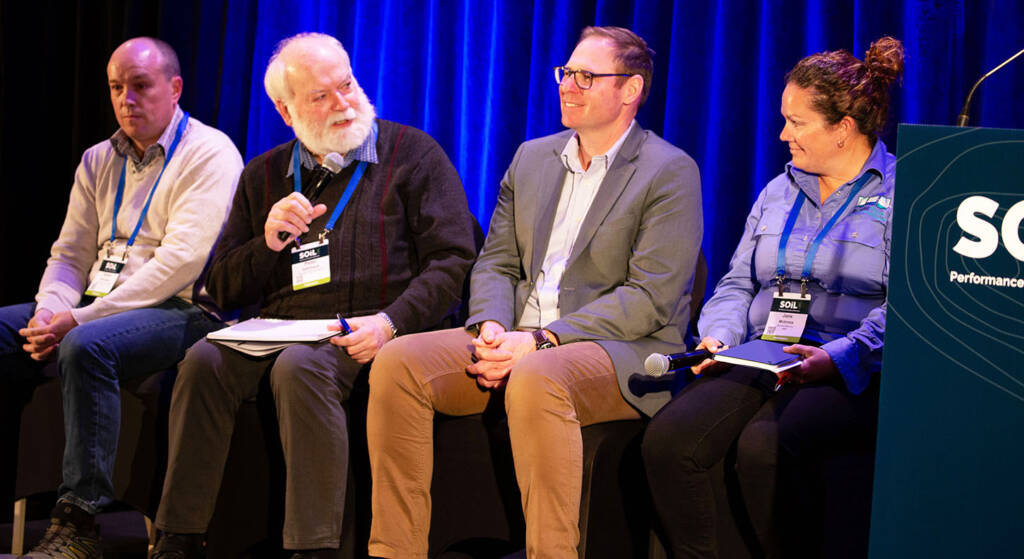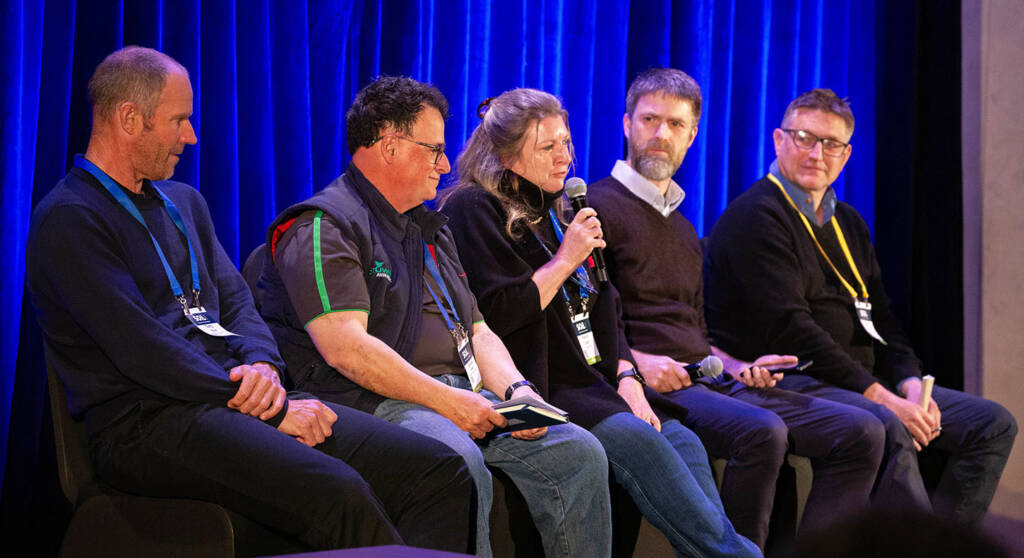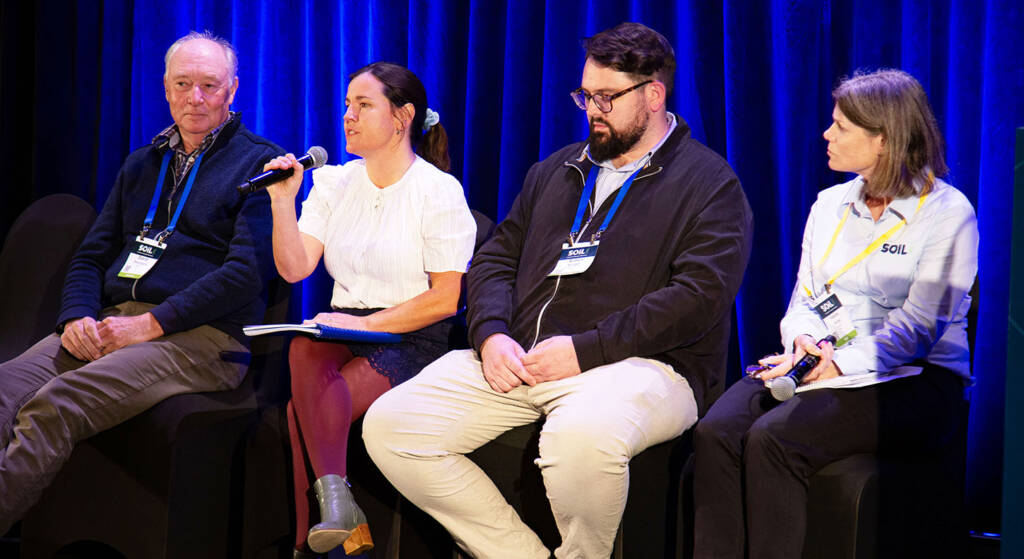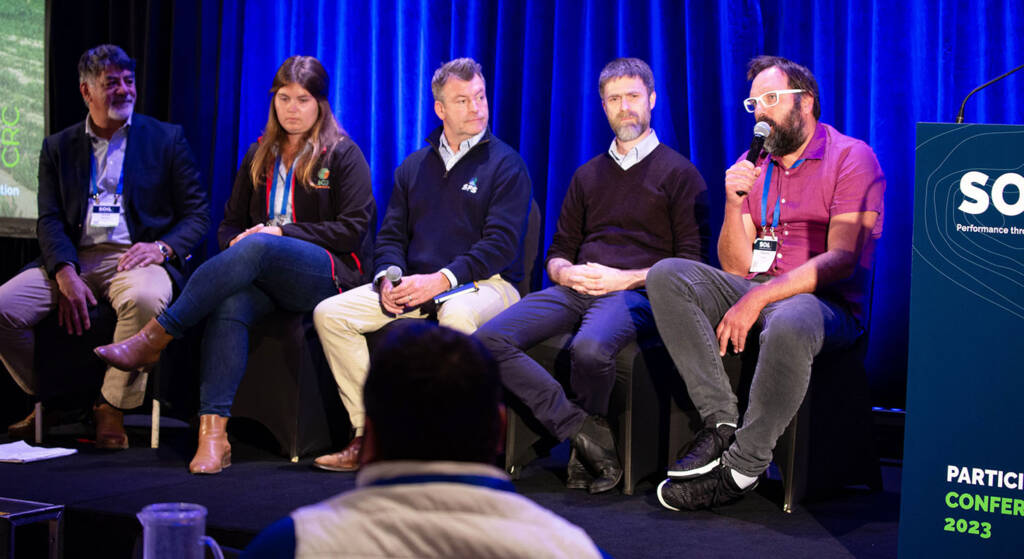The Soil CRC’s Participants Conference featured four constructive panel discussions that highlighted some of our research projects while delving into key challenges and opportunities for soil research.
The full panel discussions are available to view on Soil CRC’s YouTube channel.
Soil data
The first panel focused on how we value and manage soil data. Chaired by Soil CRC Soil Knowledge Broker, Felicity Harrop, the panel featured Federation University’s Peter Dahlhaus and Nathan Robinson, Nathan Craig from West Midlands Group and Jane McInnes from Riverine Plains.
Associate Professor Dahlhaus is leading the Soil CRC’s Visualising Australasia’s Soils project and kicked off discussions by saying that making the best decision requires the best data. “The difficulty we’re having is with people wanting to share their data,” he added. “And we’re also having trouble with people just trying to get their data into the system.”
This segued into Dr Robinson speaking about our Improving soil data management project, which is helping uncover the available data and encourage better data management. “If you can’t find it, it doesn’t exist, so let’s make it findable,’ he implored. “You need to let people know that this stuff exists and then you can have the next conversation about the new research and new insights.”
Dr Craig provided a grower group perspective and touched on the way West Midlands Group manages and stores the data they capture. He spoke about the challenge of working collaboratively with farmers to ensure the data received is in the same format and can be interpreted to provide information in a timely manner.
“We’ve got an app that we’ve been working with that standardises that collection process into something that we can scale and roll out to our collaborating organisations,” he said.
Jane McInnes highlighted the importance of interpreting data and understanding the story that goes with it, so that data isn’t taken and used in the wrong context.
The panel also discussed the value proposition for farmers to share their data. They touched on grower groups leading by example and using best practice data management, and research teams communicating the benefits for farmers now and into the future.

Plant-based solutions
A panel on plant-based solutions for improving soil health delved into the role of winter and summer cover crops and intercrops. Felicity Harrop again chaired the panel, and was this time joined by Terry Rose from Southern Cross University, Herbert Cane Productivity Services’ Lawrence Di Bella, Felicity Gilbert from Wheatbelt NRM, David Minkey from Western Australian No-tillage Farmers Association (WANTFA) and Soils for Life’s James Diack.
Professor Terry Rose set the scene by explaining that cover crops, in the context of the panel discussion, are crops that are grown during a traditional fallow period, not for harvest. And intercrops are two or more species growing simultaneously.
The panel discussion highlighted the varying challenges and opportunities for cover and intercropping across different states.
Lawrence shared his experiences with cover crops in north Queensland, mixing different species together to address the challenges of a variable climate, and the resulting benefits.
Felicity spoke about the very different challenges of farming in the West Australian Wheatbelt and how cover crops and intercrops can help manage these. Also from Western Australia, David noted the uptake of cover cropping across the state is low, particularly for summer cover crops when rainfall is unreliable.
James highlighted the results coming out of the South Australian Paddock Labs project that Soils for Life is involved in, and the successes and challenges of harvesting two crops at the same time.
Professor Rose then spoke about the research outcomes of Soil CRC’s Plant-based solutions project, and concluded the results are context specific. “It always comes back to the rainfall, the soils and the cropping system in a particular region,” he said.

Knowledge sharing
The knowledge sharing panel asked the question ‘How can we do it better?’ Soil CRC’s Program 1 Leader Professor Catherine Allan guided the discussion with Hanabeth Luke from Southern Cross University, Simon Kruger from West Midlands Group, Eyre Peninsula consultant David Davenport and Soil CRC’s Felicity Harrop.
As leader of the Soil CRC’s knowledge sharing project, Hanabeth explained what the project is trying to achieve and how it’s measuring and monitoring progress. She also highlighted some of the research findings so far, which are helping inform the Soil CRC’s work.
As a representative of the farmer groups involved in the knowledge sharing project, Simon agreed that the project is also about having lots of conversations and sharing what is working, as well as what isn’t. He said he is excited about the knowledge sharing guide that will come out of this project, which will benefit both grower groups and researchers.
The panel discussion highlighted that different farmers receive information in different ways and messaging needs to be tailored to suit specific audiences.
David noted the importance of sourcing skilled extension providers to successfully deliver research findings in a way that will help increase adoption.
He also spoke about how adoption happens, noting that it requires three fundamentals. “Firstly, there’s a need or desire to change; secondly, there’s the trust in the information or technology; and thirdly, there’s confidence,” he said.
Soil CRC Soil Knowledge Broker, Felicity, is working to help share the knowledge of the Soil CRC with next and end users. She gave an overview of her role and how it can help facilitate the two-way flow of information.

Building farmer innovation capability
Professor Catherine Allan also led the final Soil CRC panel, which looked at building farmer innovation capability. Sitting on this panel were Charles Sturt University’s David Falepau, Bret Ryan from Southern Farming Systems, James Diack from Soils for Life, Birchip Cropping Group’s Kate Finger and Stephen Rutter from The Scale Institute.
Professor Falepau got the ball rolling by detailing the genesis of the Soil CRC’s Building farmer innovation capability project and explaining that innovation doesn’t happen serendipitously.
Bret spoke about why Southern Farming Systems got involved in the project, noting farmers are fantastic at ideation but need support to enable these ideas to go through an innovation pathway and come to fruition.
Kate outlined why Birchip Cropping Group were keen to be part of the project team, and how their involvement has shaped the organisation and enabled staff to help growers and agronomists take an idea through an innovation process.
Soils for Life had a slightly different experience, as the farmers they work with are early adopters and highly innovative by nature. James noted their involvement in the project has helped drive internal innovation, enabling the organisation to develop a process to better listen to and understand farmer needs.
Stephen provided an industry perspective, observing that intermediaries—like grower groups and agronomists—are often best placed to facilitate innovation. He believes their role is to take farmers on a journey and guide them through the innovation process.


